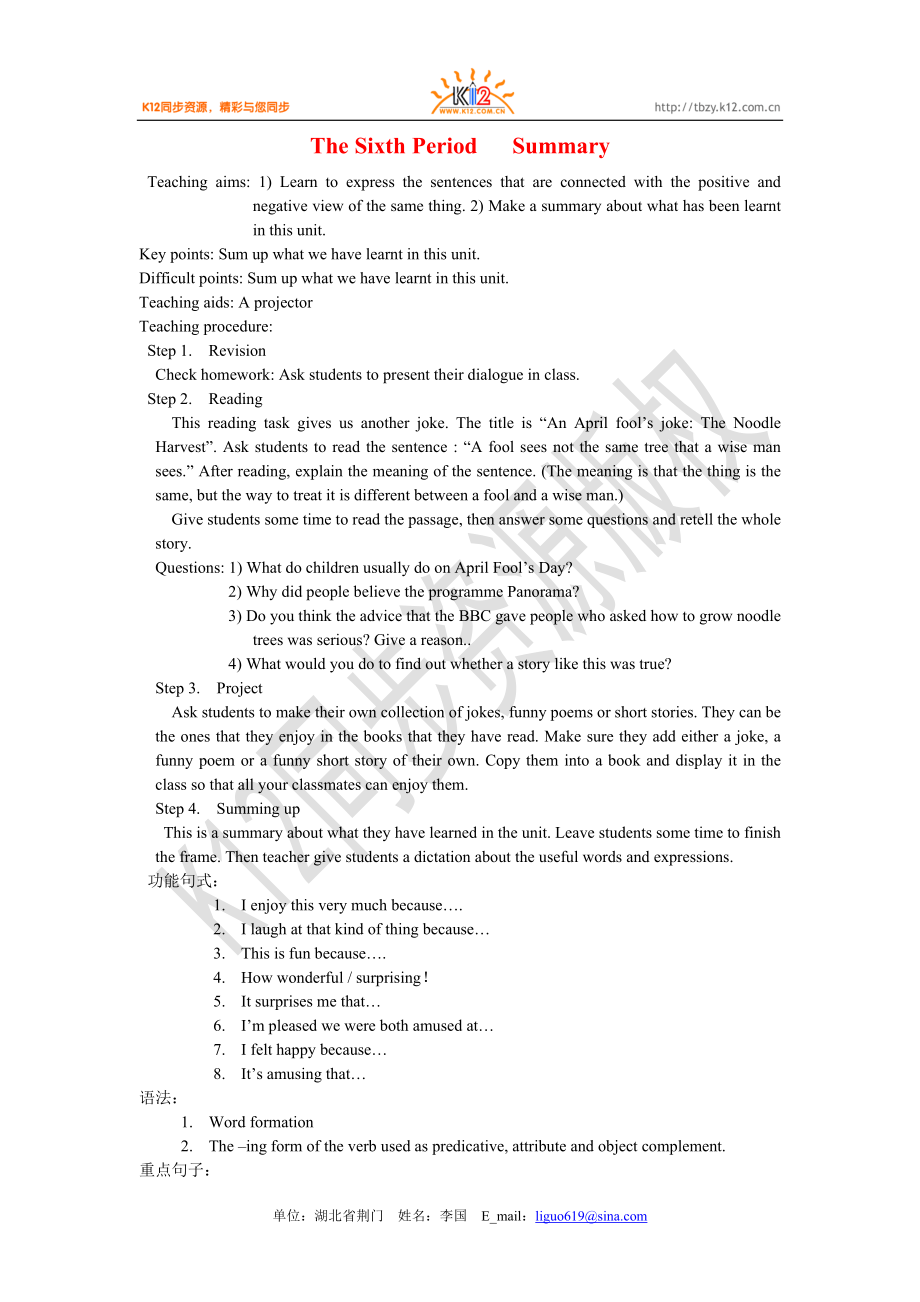《高一英語(yǔ)(下)必修四Unit 3 課時(shí)教案The SixthPeriod》由會(huì)員分享�����,可在線閱讀����,更多相關(guān)《高一英語(yǔ)(下)必修四Unit 3 課時(shí)教案The SixthPeriod(2頁(yè)珍藏版)》請(qǐng)?jiān)谘b配圖網(wǎng)上搜索。
1�、
The Sixth Period Summary
Teaching aims: 1) Learn to express the sentences that are connected with the positive and negative view of the same thing. 2) Make a summary about what has been learnt in this unit.
Key points: Sum up what we have learnt in this unit.
Difficult points: Sum up what we
2、 have learnt in this unit.
Teaching aids: A projector
Teaching procedure:
Step 1. Revision
Check homework: Ask students to present their dialogue in class.
Step 2. Reading
This reading task gives us another joke. The title is “An April fool’s joke: The Noodle Harvest”. Ask students to
3��、read the sentence : “A fool sees not the same tree that a wise man sees.” After reading, explain the meaning of the sentence. (The meaning is that the thing is the same, but the way to treat it is different between a fool and a wise man.)
Give students some time to read the passage, then answer s
4�、ome questions and retell the whole story.
Questions: 1) What do children usually do on April Fool’s Day?
2) Why did people believe the programme Panorama?
3) Do you think the advice that the BBC gave people who asked how to grow noodle trees was serious? Give a reason..
5、 4) What would you do to find out whether a story like this was true?
Step 3. Project
Ask students to make their own collection of jokes, funny poems or short stories. They can be the ones that they enjoy in the books that they have read. Make sure they add either a joke, a funny poem or a fun
6�����、ny short story of their own. Copy them into a book and display it in the class so that all your classmates can enjoy them.
Step 4. Summing up
This is a summary about what they have learned in the unit. Leave students some time to finish the frame. Then teacher give students a dictation about the
7、 useful words and expressions.
功能句式:
1. I enjoy this very much because….
2. I laugh at that kind of thing because…
3. This is fun because….
4. How wonderful / surprising�����!
5. It surprises me that…
6. I’m pleased we were both amused at…
7. I felt happy because…
8. It’s amusing that…
語(yǔ)法:
1.
8�、 Word formation
2. The –ing form of the verb used as predicative, attribute and object complement.
重點(diǎn)句子:
1. Do you find it funny to see someone sliding on a banana skin, bumping into someone else round a Conner, or filling down a hole in the end.
2. Perhaps it makes us feel more content with our
9、 life…
3. He became famous for using a particular form of acting, including mime and farce.
4. But he was lived by all who watched the film for his determination in overcoming difficulties and being kind even when people were unkind to him.
5. Imagine you are hungry and all there is to eat is boi
10����、led shoe.
6. He solved it by using nonverbal humor.
7. Their job is “panning for gold”.
8. This was the problem facing Charlie Chaplin in one of his most famous films.
Translate the following sentences into Chinese and pay attention to the use of the –ing form.
1. The two comedians performing o
11、n the stage are from Liaoning Province.
2. Who is the girl walking by the river.
3. The children playing the violin will give a performance next week.
4. The man with sunglass standing near the car is a cross talk artist.
5. The old lady talking to the children is a famous musician.
6. I saw a
12����、group of policemen coming out of a green jeep and running to the building.
7. I saw a dog carrying a piece of meat entering your garden.
8. I heard her singing a beautiful song at the party last night.
9. I got frightened when I saw a man playing with a snake in the park.
10. There were some boy
13、s shouting and crying under my window, so I could not fall asleep.
Step 5. Check yourself
1. Do you find it difficult to understand English humor? Why?
2. What role do you thing humor plays in your life?
3. What language points have you learned in this unit?
4. How well have you done in the exercises on the –ing form?
5. Did you have any problems in understanding this unit? How did you solve them?
Step 6. Homework
Do some preparations for unit 4.
單位:湖北省荊門(mén) 姓名:李國(guó) E_mail:liguo619@
 高一英語(yǔ)(下)必修四Unit 3 課時(shí)教案The SixthPeriod
高一英語(yǔ)(下)必修四Unit 3 課時(shí)教案The SixthPeriod

